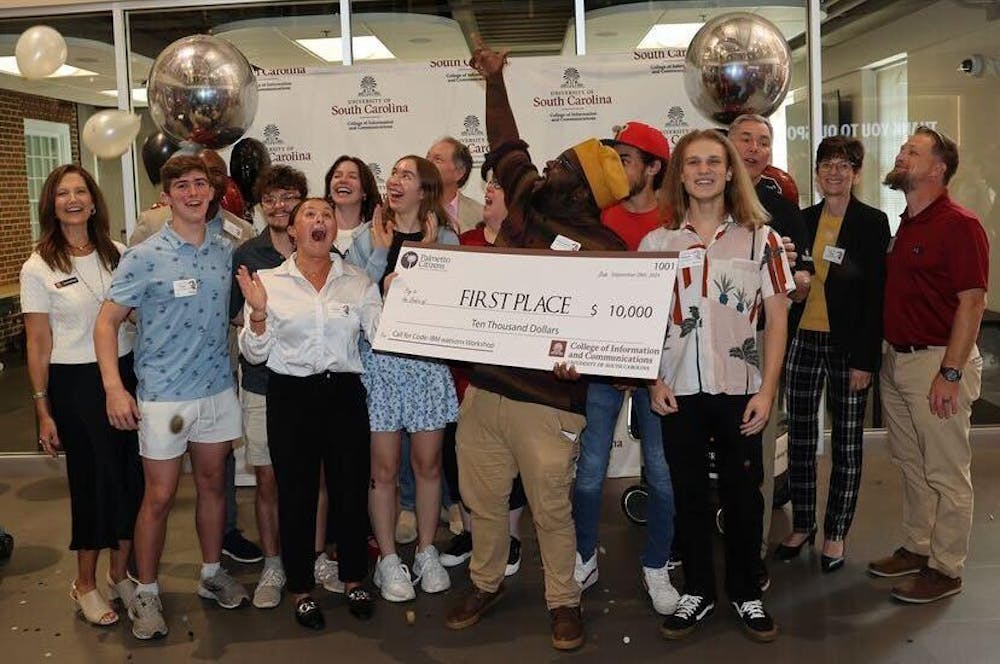A team of students from around South Carolina, five of which were from USC, walked away from the statewide Call for Code competition on Sept. 28 with a total of $10,000 for designing an AI-powered audiobook app that helps young children learn how to read.
Run by tech giant IBM, the competition is an initiative that has partnered with over 1,000 universities around the world, including USC.
The aim of the event was to come up with solutions or aids for pressing humanitarian issues in society. Call for Code was open to college students across South Carolina to give them an opportunity to gain experience with AI and use the software to help solve problems in the community. USC's competition hosted 20 teams with nine to 10 people in each group.
“There was a big theme for (the) competition, and this year was equitable access," third-year advertising student Hayden Hamlin said. "And so we were trying to think of ideas that would match that."
The Call for Code is one of many of USC’s efforts to familiarize students with AI. Competing teams were tasked with identifying a problem facing their community or the world at large, using generative AI to propose a solution.
Fourth-year international business and marketing student Caroline Noland said that a lecture on AI in one of her marketing classes sparked her interest in the program.
“(AI) is a really big thing in marketing right now," Noland said. "A lot of people use it in marketing to create prompts for ideas, or trend research, like, ‘give me the top 10 trends right now,’ something like that, so you can kind of program (AI) how you want."
The competition included a workshop beforehand, in which students learned how to use and train watsonx, one of IBM's generative AI tools. Following the workshop, the students were split into teams and competed against each other to create a proposed solution for a challenge facing society.
Second-year computer science student Tyler Shaughnessy said training the software consisted of inputting prompts into it and then adjusting how the prompts are answered.
“You can't really get it to work perfectly in an hour, which is what we had, but I think we got a pretty good model," Shaughnessy said.
Because of the competition’s proximity to Hurricane Helene, many teams’ solutions dealt with problems stemming from the storm. But the first-place team had a unique perspective in the form of two library science graduate students, Richland Library Librarian Christopher Fleming and South Carolina State Museum Collections Associate Barbara Rohrer.
Instead of solving a problem related to Helene, the team decided to create an educational app targeted at young children learning to read.
This led the group to create a proposal for a virtual audiobook app, with vocabulary aid, customizable narration and stories created by AI. Dubbed "LIbrAry" (with a capital AI), the theoretical application would be designed to help young children learn to read by listening.
"Our two librarians said a lot of what's missing is that child and mother engagement when it comes to reading, because the child is really going to respond more to their mom ... rather than just some random lady reading a story," Noland said.
The objective of improving literacy skills in children was initially thought of by Fleming and Rohrer, and the application itself was refined by the rest of the team.
“We had to make the idea more specialized, because we had maybe an app that could potentially read to kids, or maybe an app that can sound out words, and it was just a ton of ideas," third-year graphic design and illustration student Margo Pershyna said. “We had to make it really specific, and that's how we ended up creating a generative storytelling app that generates stories and sounds out the words for the kids to allow … improvement (in reading)."

Noland said the originality of the idea and Fleming’s public speaking skills aided the first-place team in achieving its victory. She said they were “shocked” when they learned they had taken first place.
Each member of the winning team said they plan to use their $1,000 prize in a variety of different ways.
“I put half of mine towards my deposit for the Barcelona Maymester for the (journalism school)," Hamlin said. "And the other half, I’m just gonna chill with it, I guess just look at it in my bank account."
All of the student winners said Call for Code was helpful in teaching them about generative AI and collaborating with people with diverse experiences. Pershyna and Hamlin both said that they would participate in similar events in the future.
“I always love hearing about other people's experiences and their backgrounds, and so having a wide age range was fun for the project itself but also just as an experience to take with me. And collaboration is always more fun when it's (with) a wide range of people who are not the same demographic as you,” Hamlin said. “Having two (library science graduate students) at the same time, randomly … pushed into our team, it was great luck .... and they added an extra layer of sincerity and genuineness to the idea.”

